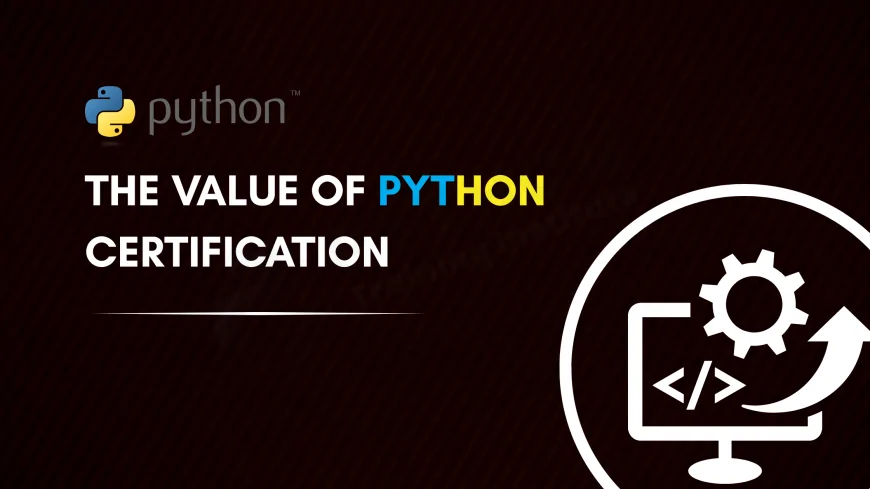Is Python Certification Necessary for Jobs | Career Impact Explained
Wondering if Python certification is necessary to get a job? Discover how recognized Python courses in Pune help boost your career prospects, enhance your resume, and open doors to high-demand tech roles. Learn the benefits, industry value, and hiring trends in this complete guide.

In today's competitive tech landscape, Python has emerged as a versatile and in-demand programming language. Its applications span web development, data science, artificial intelligence, automation, and more. As a result, many aspiring developers and professionals consider obtaining a Python certification to enhance their job prospects. But is a Python certification truly necessary for securing a job? Let's delve into this topic to understand the value and implications of Python certifications in the job market.
Understanding Python Certification
A Python certification is a formal recognition that signifies an individual's proficiency in the Python programming language. It is typically awarded after an individual has passed an examination or completed a specific course that tests their understanding of Python's core concepts, techniques, and best practices. Certifications can range from entry-level to advanced, catering to various skill levels and career aspirations.
The Role of Python Certification in the Job Market
1. Validation of Skills
For beginners or those transitioning into tech roles, a certification can serve as a testament to their dedication and foundational knowledge. It provides a structured learning path and ensures that the individual has covered essential topics in Python.
2. Competitive Edge
In a saturated job market, having a certification can set candidates apart. It demonstrates a commitment to continuous learning and can be particularly beneficial when vying for roles that receive numerous applications.
3. Not a Sole Determinant
While certifications can enhance a resume, they are not the sole criteria employers consider. Practical experience, problem-solving abilities, and soft skills often weigh heavily in hiring decisions. As highlighted in a discussion among hiring managers, certifications were rarely the primary focus during evaluations.
When Is Python Certification Beneficial?
1. Career Transition
Individuals shifting from non-technical backgrounds to tech roles can benefit from certifications. It provides them with a structured curriculum and a tangible credential to showcase their newly acquired skills.
2. Structured Learning
For those who prefer guided learning, certifications offer a systematic approach to mastering Python. It ensures coverage of fundamental topics and often includes assessments to gauge understanding.
3. Access to Resources
Many certification programs provide additional resources, such as access to exclusive forums, study materials, and practice exams, enhancing the learning experience.
Limitations of Relying Solely on Certification
1. Lack of Practical Experience
Certifications might not always reflect real-world problem-solving abilities. Employers often prioritize hands-on experience and the ability to apply knowledge in practical scenarios.
2. Varied Recognition
Not all certifications carry the same weight in the industry. Some employers may value certain certifications over others, depending on their relevance and the issuing organization's reputation.
3. Continuous Learning
The tech industry evolves rapidly. Relying solely on a certification without ongoing learning and skill enhancement can render one's knowledge obsolete over time.
Alternatives and Complements to Certification
1. Building a Portfolio
Creating and showcasing projects on platforms like GitHub can provide tangible evidence of one's skills and problem-solving capabilities.
2. Contributing to Open Source
Engaging in open-source projects allows individuals to collaborate with others, gain real-world experience, and demonstrate their commitment to the developer community.
3. Networking and Community Engagement
Participating in tech meetups, forums, and online communities can lead to learning opportunities, mentorship, and potential job leads.
FAQ's
1. Is a Python certification required to get a job in IT?
While not mandatory, a Python certification from a reputed institute like the Python Training Institute in Pune can boost your resume. It validates your skills and shows employers your dedication to learning.
2. Do companies prefer certified Python developers?
Many companies appreciate certification, especially from recognized institutes. Python Training Institute in Pune offers industry-aligned courses that prepare you for roles in software development, automation, and data analysis.
3. Can I get a job without a Python certification?
Yes, jobs are possible without certification if you have a strong portfolio and hands-on skills. However, a certification from the Python Institute in Pune makes your application more competitive.
4. How does Python certification help freshers?
Python certification helps freshers by providing structured learning and proof of competence. Institutes in Pune offer beginner-friendly courses with projects to build real-world experience.
5. Which Python certifications do employers value the most?
Employers value certifications with practical training and industry recognition. The Python Training Institute in Pune offers hands-on, placement-ready certifications trusted by tech recruiters.
6. What job roles can I apply for with Python certification?
Python-certified professionals can apply for roles such as Python Developer, Data Analyst, Automation Engineer, and Web Developer. Pune-based training programs cover all required topics.
7. Does Python certification improve salary prospects?
Yes. Certified professionals often receive better salary offers. Python Training Institute in Pune’s certification enhances your credibility and opens up higher-paying opportunities.
8. Can a Python course from Pune help me get remote jobs?
Absolutely! Python skills are in demand globally. A certification from a reputed Pune institute, combined with a project portfolio, makes you job-ready for remote work.
9. Is it better to do a certification course or self-learn Python?
While self-learning works for some, certification courses like those in Pune offer structured learning, mentorship, real projects, and career support—essential for beginners.
10. Are Python bootcamps worth it for getting a job?
Yes. Python bootcamps, especially in Pune, offer intensive training with real-time projects and career services like mock interviews and resume building for better job outcomes.
11. How long does it take to complete a Python certification?
Typically, a Python certification course at Pune institutes takes 2–3 months, depending on your pace. Fast-track and weekend options are also available.
12. Is an online Python certification as valuable as offline?
Yes, if it's from a reputed institute like Python Training Institute in Pune, which offers both online and offline modes with live projects, support, and placement assistance.
13. Will a Python certificate help me switch careers into tech?
Definitely! Python certification from Pune can help non-tech professionals transition smoothly into tech roles, especially in fields like data analytics and automation.
14. Do recruiters check the authenticity of Python certificates?
Yes, especially for reputed companies. A certification from a well-known institute in Pune like WebAsha Technologies boosts trust and credibility.
15. Is a basic Python certification enough to get a job?
For entry-level roles, yes. Pune’s Python institutes often offer beginner-to-advanced learning paths to help you grow steadily after your first job.
16. Are there internship opportunities after certification?
Yes, many Python Training Institutes in Pune offer internship programs post-certification. These internships help apply your knowledge in real scenarios and build your resume.
17. Will Python certification help me if I want to learn Data Science?
Absolutely. Python is the backbone of Data Science. Training institutes in Pune often include data science modules along with Python basics for broader career paths.
18. Can certification help me land freelance or gig work?
Yes. Freelancing platforms often value certified skills. A Python certificate from Pune can help establish credibility with potential clients.
19. Do Pune-based Python institutes offer placement support?
Yes. Reputed institutes in Pune provide 100% placement assistance, including resume prep, mock interviews, and direct company tie-ups for certified students.
20. Is Python certification valid internationally?
Yes, if earned from a recognized institute. Many Pune-based institutes offer globally accepted certifications, especially those aligned with international standards.
21. What industries hire certified Python professionals?
Industries like IT, finance, healthcare, e-commerce, and education hire Python-certified professionals. Python Training Institute in Pune prepares students for versatile career opportunities.
22. What are the prerequisites for a Python certification course?
Most beginner courses in Pune require no prior coding knowledge. Just basic computer skills and a willingness to learn are enough to get started.
23. Are there Python certifications with job guarantee in Pune?
Some institutes in Pune, like WebAsha Technologies, offer job-oriented certifications with placement guarantees, especially for intensive programs.
24. How do I choose the right Python certification course?
Look for institutes in Pune with updated curriculum, practical training, experienced mentors, good student reviews, and placement support.
25. What should I do after getting Python certified?
Start applying for jobs, build more projects, explore frameworks like Django or Flask, and consider specializations like machine learning to advance your career. Pune institutes often guide you in this next step.
Launch Your Career with a Python Course
While a Python certification is not an absolute necessity for securing a job, it can be a valuable asset, especially for beginners or those transitioning into tech roles. It offers structured learning, validates foundational knowledge, and can enhance a resume. However, it's essential to complement certifications with practical experience, continuous learning, and active engagement in the tech community to truly stand out in the job market.
What's Your Reaction?
 Like
0
Like
0
 Dislike
0
Dislike
0
 Love
0
Love
0
 Funny
0
Funny
0
 Angry
0
Angry
0
 Sad
0
Sad
0
 Wow
0
Wow
0















